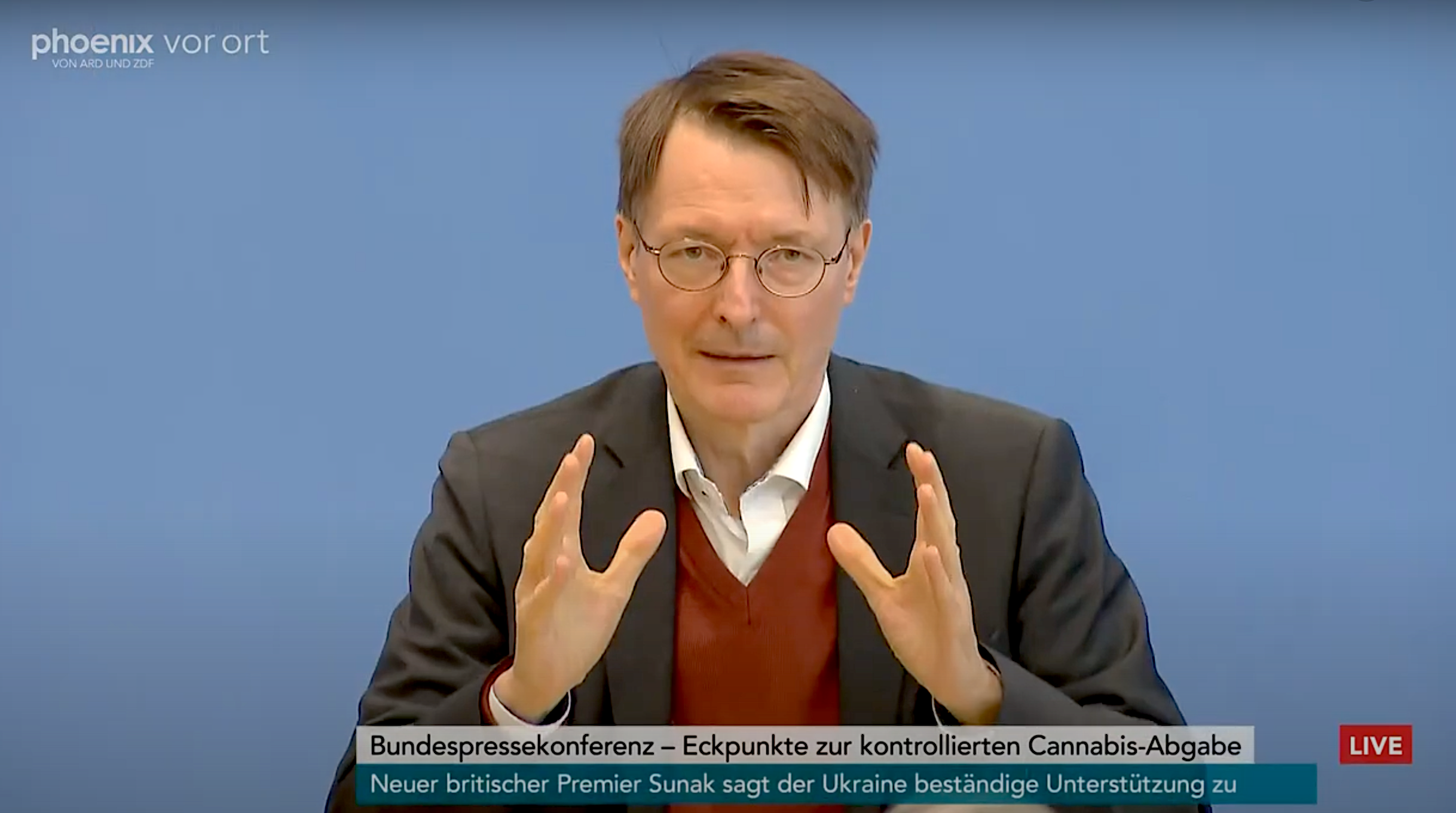German Health Minister Karl Lauterbach said this week that around 4 million people used cannabis in Germany in 2021, 25% of whom were under the age of 24. Lauterbach convened a press conference in Berlin on the 26th of October to present the proposal on the key points of adult use regulation in Germany. One study from the Düsseldorf Institute for Competition Economics reveals that full legalization could represent annual tax revenue for Germany of around €4,7 billion and the creation of 27 new jobs, but there is still a barrier to overcome: legislation in the European Union .
At the press conference, convened to announce the key points of legalization, Lauterbach began by pointing out that the measures announced by the German government should not be seen as a “great advance”, but rather as the initial phase of a process, anticipating the difficulties that you will find in international conventions and in European Union (EU) legislation.
The German minister also stressed that legalization could end the illicit cannabis market in Germany. “If this law passes, it will be the most liberal project to legalize cannabis in Europe, but also the most regulated market,” Lauterbach told a news conference. “It could be a model for Europe,” he said.
The Minister of Justice, Marco Buschmann, also wrote in the Twitter that “a purely repressive drug policy has failed. That's why we want to legalize cannabis use responsibly. This means better product quality and therefore health protection as well as relief for our authorities so they can focus on more important things!”
The proposals put forward by the German government
Karl Lauterbach presented at the Press conference, last Wednesday, in Berlin, a document with the key points (Key Issues paper) on legislation planned to regulate the controlled distribution and use of recreational cannabis among adults.
Germany will now submit the document to the European Commission for pre-assessment and will only draft a law when the Commission approves the plan, the minister added.
The most important points proposed by the German government for the legalization of cannabis were the following:
- In the future, cannabis and tetrahydrocannabinol (THC) will no longer be legally classified as narcotics;
- Production, supply and distribution are permitted within a government-licensed and controlled framework;
- The acquisition and possession of up to a maximum of 20 to 30 grams of recreational cannabis for personal consumption in private and public spaces is permitted without penalty;
- Private cultivation is allowed to a certain extent;
- Ongoing investigations and criminal proceedings must be terminated for actions that are no longer criminal;
- Distribution can take place with age control in licensed specialty stores and, if necessary, in pharmacies:
- Advertising for cannabis products is prohibited;
- Specifications are defined to ensure quality and purity;
- Minimum age limit for sale and purchase is 18 years (possibly with an imposed limit on THC content for those under 21);
- The introduction of a special consumption tax (“cannabis tax”) is planned;
- Cannabis-related education and prevention work, as well as specific counseling and treatment offerings for target groups, are being developed.
The minister anticipated that Germany intends to maintain domestic cannabis production, either in outdoor, indoor or through greenhouses. “We are currently planning full cultivation in Germany, that is the current direction,” confirmed Lauterbach.
The way in which drinks and edibles with cannabis will be regulated, however, has not been made clear. “An extension of so-called edibles (products other than food intended for oral consumption) will be examined at the latest as part of the assessment of the law”, reads the document, which does not clarify about “dosage forms for smoking, inhaling liquid, for nasal and oral ingestion in the form of capsules, sprays and drops”.
More details on all planned content can be found on Federal Government key points document on the controlled sale of cannabis.
Breaking the EU barrier will not be easy
Alfredo Pascual, one of the most renowned analysts of the cannabis industry, who has lived in Germany for several years, warned on his LinkedIn page that continuing to lecture on the various details of German regulation could just be “a distraction”.
“It would be fun to talk about all the other details, but a distraction, because the key question now is what will happen at the EU level”, says Pascual, who described three possible scenarios for the future.

Alfredo Pascual presented “The international implications of cannabis legalization” at the PTMC – Portugal Medical Cannabis conference, in Lisbon, in June 2022
“As of now, I see three options:
1) The EU responds to Germany: Go ahead, your interpretation is solid and we don't see any problems of international law. And Germany legalizes, as planned.
2) The EU responds to Germany: Hmm… it might work if they change X, Y and Z. And Germany adapts the plans. And it's legal. But it is difficult to predict from now on what this legalization might look like in this scenario.
3) If the EU Commission's response is “clearly negative” (Lauterbach's words), meaning that the Commission's understanding would be that the German legalization proposal would violate international law, no cannabis legalization project will be drafted. And Lauterbach has also indicated that he is not a fan of decriminalization as a "plan B."
The bill should be presented to the Bundestag as early as possible, in the first quarter of 2023, if all goes well. But Lauterbach said it would be "unrealistic" to expect the law to pass in the summer of 2023 because of the complexity of that process. He signaled that a realistic scenario if all goes well (including the conversation with the European Commission) is legalization to happen in 2024″, predicts Alfredo Pascual.
Revenues could exceed 4 billion euros
The tax effects of legalizing cannabis in Germany would also be quite considerable (and appealing). According to a table published in the study by the Düsseldorf Institute for Competition Economics, on cannabis taxes alone, the government could collect €1.8 billion in cannabis taxes, plus €650 million in VAT (Value Added Tax). In addition to revenue, legalization would save police expenses (amounting to more than one billion euros) and costs with the courts, prosecutors and prisons (in the order of 313 million euros), which would translate into a positive balance of EUR 4,705 billion for Germany's coffers.











































